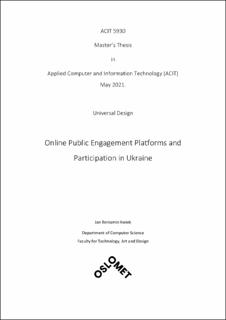| dc.description.abstract | Participation and accessibility in ICT are according to Amartya Sen determining for equality of opportunity (Toboso, 2011). The future is digital and removing barriers that cause exclusion and to promote more participation is key according to current research (Toboso, 2011).
Online public engagement platforms are digital platforms where citizens can perform civic activities, one example of this is the EDEM platform. EDEM platform is an online public engagement platform launched in Ukraine as a pilot through the cross-disciplinary network Evidence in Governance and Politics (EGAP n.d.). Through investigating the implementation of the EDEM platform in Ukraine and the barriers citizens experienced, this paper aims to map out the citizens experiences and the outputs and outcomes of the implementation.
This thesis is using the qualitative methods (Patton, 1990) semi-structured interviews (Longhurt, 2003) and data document data analysis (Bowen, 2009). Furthermore, the thesis is analysing the data findings using thematic analysis (Boyatziz, 1998) and recursive abstraction (Polkinghorne, Arnold, 2014). For a thorough analysis the aims are answered with the implementation in Ukraine as an example. Although this is specific to a country, it can give indications on how an implementation and the barriers surrounding this are in other implementations of public engagement platforms.
According to research by Mossberger, Tolbert and McNeal young Americans are more likely to show interest in politics if it is on the web (Mosseberger, Tolbert & McNeal, 2007). This is likely translated to other countries in the same matter. Participation in elections and democratic processes can be seen from the research of Blais, Gidengil and Nevitte which shows that voter turnout is declining, and especially voter turnout of younger generations (Blais, Gidengil, Nevitte, 2004). In sum the research shows that young voters do not vote and that young voters are more likely to vote if it is on the web. In other words, Online Public Engagement Platforms are important for the future of democracy. | en_US |
